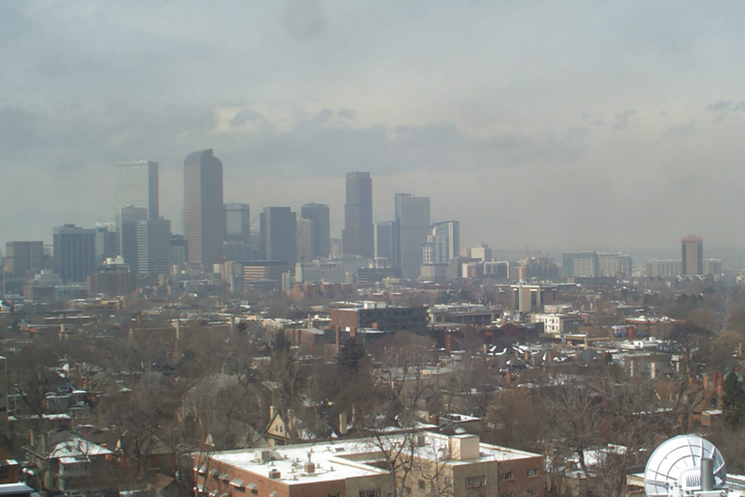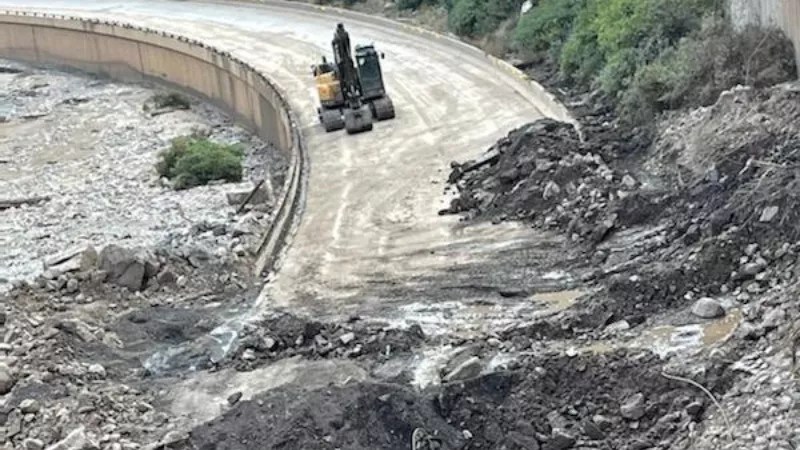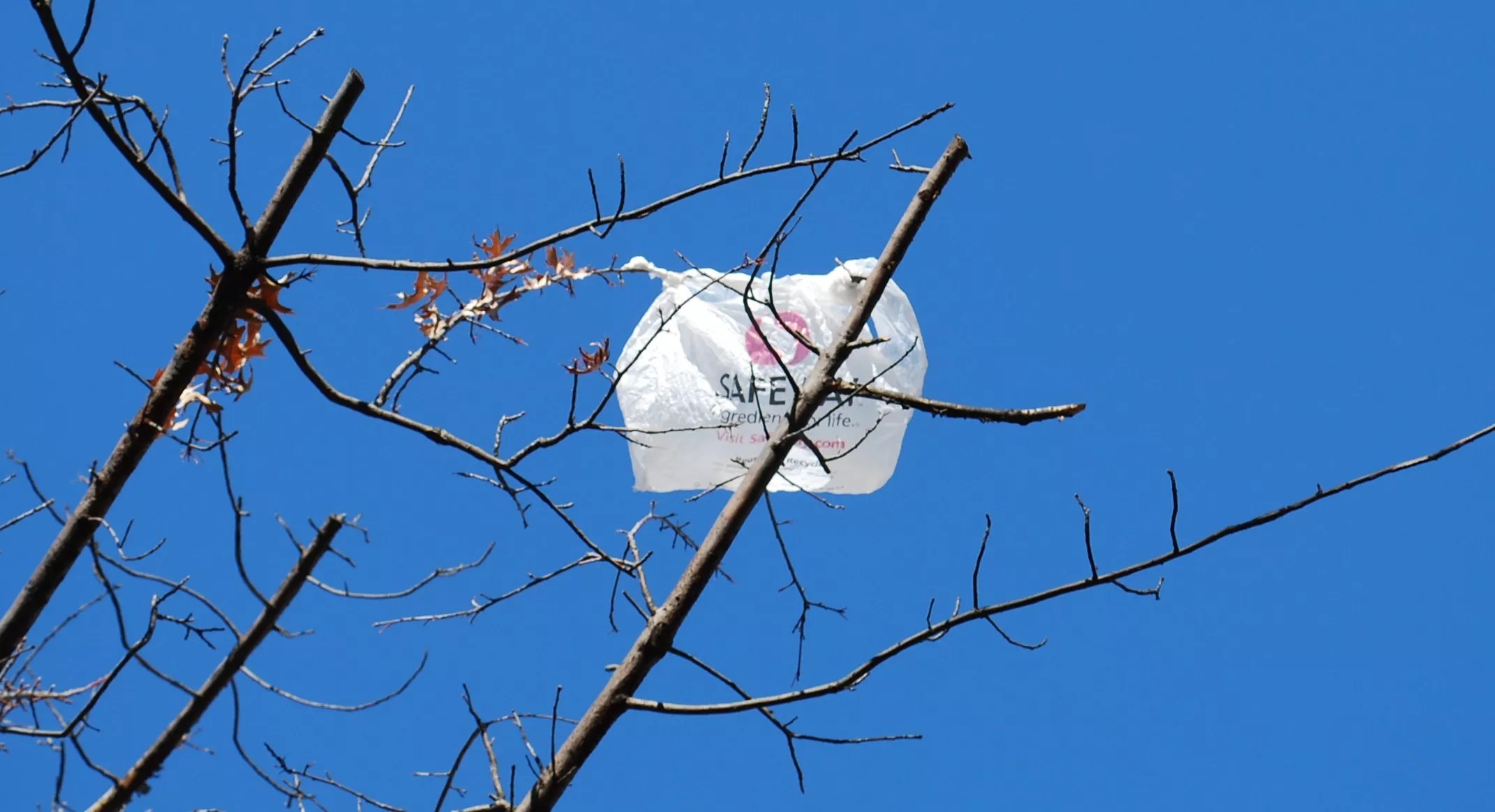
CDPHE

Audio By Carbonatix
Denver spent the summer breathing polluted air, the late fall waiting for snow, and all year in a state of drought. As some activists try to implement fixes for climate change, others wonder if it’s too little, too late.
Here are the ten biggest Colorado environmental stories of 2021:
Clearing the air
As Denver made headlines for having the worst air quality in the world one day in August and the state continued to suffer from excess ozone combined with wildfires pumping pollution into the air, Colorado’s Air Pollution Control Division also went up in smoke. Whistleblowers came forward alleging unlawful conduct at the agency, and former employees described a culture of fear. As part of a resulting investigation, the agency’s director, Garry Kaufman, was reassigned to a post as deputy director of regulatory affairs.

Debris covering portions of Interstate 70 in Glenwood Canyon makes it difficult for the Colorado Department of Transportation to assess the level of damage to the roadway and bridges.
Clear as mud
On July 29, a mudslide caused by unprecedented rainfall over a burn scar from the 2020 Grizzly Creek fire made a section of Interstate 70 in Glenwood Canyon completely unpassable. This wasn’t the first time that a mudslide had shut down that section of the interstate, but it was the longest closure, lasting over two weeks. The Glenwood Canyon conundrum remains a flashpoint in the ongoing story of how climate change is changing Colorado.
River of no return
Nearly the entire state of Colorado experienced moderate to extreme drought in 2021, and nowhere was that more evident than along the Colorado River and its tributaries. Stories about the Dolores and Yampa rivers drying showed that problems extend across the state. Meanwhile, the Colorado River itself is over-appropriated, with less water than has been claimed. As the seven states with rights to the river, including Colorado, begin to renegotiate a 1922 pact, Native tribes are fighting for an official role in the river’s management for the first time.
Where’s the snow?
Although Denver saw its fourth-largest snowstorm ever in March 2021, the lack of snow became a major weather story in late fall. From April 22 to December 10, the city didn’t see a measurable snowfall; those 232 days surpassed the previous record of 225 for most days without snow, set back in 1888. On Twitter, @denversnow jokingly lamented the lack of white stuff, while meteorologists cautioned that this was no laughing matter, since the majority of Colorado’s water supply throughout the year comes from the snowpack.
Fanning the flames
As climate change has fanned the flames of wildfires in recent years, Colorado has been slow to identify the causes of human-ignited fires. That’s because Colorado is the only western state without a fire marshal, so there is no central control over investigations, especially when volunteer firefighters are first on the scene. Experts told Colorado Public Radio that when there is no cause identified prevention is tougher.
A bumpy climate road map
In 2019, Governor Jared Polis committed the state to a 26 percent reduction in emissions by 2025 and a 50 percent reduction by 2030. In 2021, he finally delivered a “roadmap” to make that happen; the route includes regulations on transportation, oil and gas production and buildings. Critics said that the road map didn’t include enough feedback from impacted communities, and in a September update, Colorado Energy Office Executive Director Will Toor said that cutting emissions in the transportation sector will be the most complicated.
Hit the road
Highway expansion is a perennial concern for Coloradans, but the big projects had a big year: The Interstate 25 gap work will wrap up ahead of schedule, and the Interstate 70 expansion is well on its way to completion. In the future, however, state and local governments will have to consider the pollution and greenhouse gas emissions of new projects, which could impact highway expansions. The new Colorado Department of Transportation rule finalized in December will require governments to offset any projects with a pollution level above certain limits; some estimates say that will shift $6.7 billion to public transportation by 2050.
A carbon-free Xcel?
Xcel Energy, Colorado’s largest utility provider, has committed to 100 percent carbon-free energy by 2050. In January it announced that it would close the Hayden Generating Station early; in November, the utility reached an agreement to move up to 2035 the closure of one of the state’s largest polluters, the Comanche Generating Station in Pueblo. The Colorado Public Utilities Commission is now holding hearings to determine whether the utility is doing enough to cut emissions and help curb global warming.

Say goodbye to plastic bags, unless you’re willing to pay for them.
Owen Parrish/Flickr
One word: plastic
In Denver, retail and grocery stores started charging for plastic bags in July; the implementation had been delayed a year because of COVID-19. But Denver City Council continued to work on reducing single-use plastics; in May it approved a measure requiring food delivery companies to ask people whether they want to opt in to plastic utensils. And by 2024, the entire state will have a plastic bag and foam container ban, thanks to House Bill 1126, which Governor Polis signed into law this July.
But it’s a dry heat
Every ten years, the National Oceanic and Atmospheric Administration updates climate “normals,” which are used to determine if weather is unusual or typical. In 2021, the updates showed that Colorado experienced hotter temperatures and less precipitation from 2011 to 2020 than it did from 1991 to 2010. For the next ten years, when meteorologists reference normal weather stats, they will be using these new NOAA measurements.